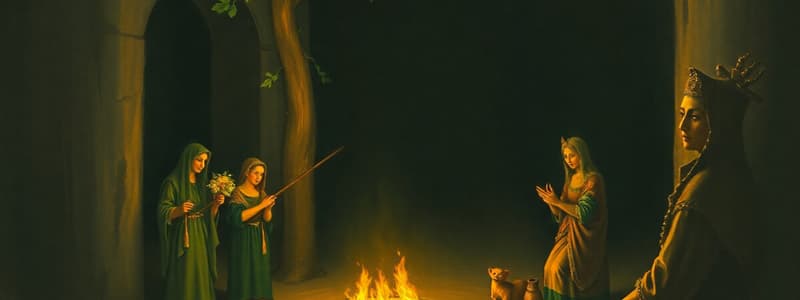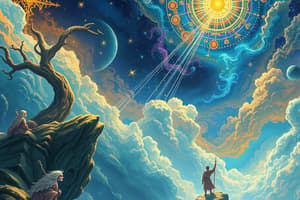Podcast
Questions and Answers
Which Jewish festival celebrates the giving of the Torah on Mount Sinai?
Which Jewish festival celebrates the giving of the Torah on Mount Sinai?
- Shavuot (correct)
- Sukkot
- Rosh Hashanah
- Hanukkah
Yom Kippur is a day of celebration and feasting.
Yom Kippur is a day of celebration and feasting.
False (B)
What does the word 'Gospel' mean, and what is its significance in Christianity?
What does the word 'Gospel' mean, and what is its significance in Christianity?
The word 'Gospel' means 'good news'. In Christianity, it refers to the message of Jesus Christ's life, death, and resurrection, and the saving power it offers.
The Protestant Reformation was a movement in the ______ century that sought to reform the ______ Church.
The Protestant Reformation was a movement in the ______ century that sought to reform the ______ Church.
Which of the following is considered the most important Veda?
Which of the following is considered the most important Veda?
Shiva is known as the creator in Hindu mythology.
Shiva is known as the creator in Hindu mythology.
What term refers to the philosophical commentary on the Vedas?
What term refers to the philosophical commentary on the Vedas?
The first goal of life in Hinduism is _____, which refers to pleasure.
The first goal of life in Hinduism is _____, which refers to pleasure.
Match the Hindu castes with their descriptions:
Match the Hindu castes with their descriptions:
Which class in Hindu society is considered the lowest?
Which class in Hindu society is considered the lowest?
The Bhagavad-Gita is found in the Mahabharata.
The Bhagavad-Gita is found in the Mahabharata.
What does 'ahimsa' mean in the context of Hindu beliefs?
What does 'ahimsa' mean in the context of Hindu beliefs?
What is the ultimate goal of following the eight steps in Buddhism?
What is the ultimate goal of following the eight steps in Buddhism?
Right Awareness involves staying distracted from your surroundings.
Right Awareness involves staying distracted from your surroundings.
What are the three components of Mental Training in Buddhism?
What are the three components of Mental Training in Buddhism?
Buddhists aim to avoid jobs that cause _______ or exploitation.
Buddhists aim to avoid jobs that cause _______ or exploitation.
Match the following terms with their definitions:
Match the following terms with their definitions:
Which component involves training oneself to avoid bad habits?
Which component involves training oneself to avoid bad habits?
Right Living is only concerned with personal well-being.
Right Living is only concerned with personal well-being.
Explain the significance of the Star of David in Judaism.
Explain the significance of the Star of David in Judaism.
Which concept refers to the cessation of suffering in Buddhism?
Which concept refers to the cessation of suffering in Buddhism?
Siddhartha Gautama became the Buddha after realizing the truth and achieving enlightenment.
Siddhartha Gautama became the Buddha after realizing the truth and achieving enlightenment.
What does the term 'Middle Way' refer to in Buddhism?
What does the term 'Middle Way' refer to in Buddhism?
Mahatma Gandhi is known for promoting _______ as a means of resistance against oppression.
Mahatma Gandhi is known for promoting _______ as a means of resistance against oppression.
What was one of Siddhartha Gautama's significant encounters?
What was one of Siddhartha Gautama's significant encounters?
The Bodhi Tree is where Siddhartha Gautama found knowledge through study and reflection.
The Bodhi Tree is where Siddhartha Gautama found knowledge through study and reflection.
Describe the significance of Mahatma Gandhi in the context of India's independence.
Describe the significance of Mahatma Gandhi in the context of India's independence.
What was one of the primary protests of Martin Luther's Ninety-Five Theses?
What was one of the primary protests of Martin Luther's Ninety-Five Theses?
The term 'justification by faith' indicates that salvation is achieved through human efforts and good deeds.
The term 'justification by faith' indicates that salvation is achieved through human efforts and good deeds.
Who is considered the prophet of Islam?
Who is considered the prophet of Islam?
Islam comes from the Arabic word '_____' which means surrender or submission.
Islam comes from the Arabic word '_____' which means surrender or submission.
Match the following Islamic terms with their definitions:
Match the following Islamic terms with their definitions:
What does the term 'Hijra' refer to in Islamic history?
What does the term 'Hijra' refer to in Islamic history?
The Angel Jibril is also known as the Angel Michael in Islamic tradition.
The Angel Jibril is also known as the Angel Michael in Islamic tradition.
What is the significance of the Qur'an in Islam?
What is the significance of the Qur'an in Islam?
What event marked the beginning of the success of Islam?
What event marked the beginning of the success of Islam?
Brahman is the name given to the soul in Hinduism.
Brahman is the name given to the soul in Hinduism.
What are the Five Pillars of Islam?
What are the Five Pillars of Islam?
Hinduism believes in the cycle of birth, death, and reincarnation, known as __________.
Hinduism believes in the cycle of birth, death, and reincarnation, known as __________.
Which of the following is NOT one of the Five Pillars of Islam?
Which of the following is NOT one of the Five Pillars of Islam?
Vishnu is known as the creator in Hinduism.
Vishnu is known as the creator in Hinduism.
What does the term 'Karma' refer to in Hinduism?
What does the term 'Karma' refer to in Hinduism?
What does Hanukkah celebrate?
What does Hanukkah celebrate?
Shabbat is observed from Saturday to Sunday.
Shabbat is observed from Saturday to Sunday.
What is celebrated during Pesach?
What is celebrated during Pesach?
The Jewish New Year is known as __________.
The Jewish New Year is known as __________.
Match the Christian concepts with their definitions:
Match the Christian concepts with their definitions:
Which of the following commemorates the Israelites wandering in the desert?
Which of the following commemorates the Israelites wandering in the desert?
The Trinity refers to God as the Father, Son, and Holy Spirit.
The Trinity refers to God as the Father, Son, and Holy Spirit.
Who is a prominent figure associated with the Protestant Reformation?
Who is a prominent figure associated with the Protestant Reformation?
Flashcards
Pesach (Passover)
Pesach (Passover)
The Jewish festival celebrating the Israelites' liberation from slavery in Egypt.
Hanukkah (Festival of Lights)
Hanukkah (Festival of Lights)
A Jewish festival commemorating the rededication of the Second Temple in Jerusalem.
Shabbat
Shabbat
The Jewish Sabbath, a day of rest and prayer.
Rosh Hashanah
Rosh Hashanah
Signup and view all the flashcards
Yom Kippur (Day of Atonement )
Yom Kippur (Day of Atonement )
Signup and view all the flashcards
Shavuot
Shavuot
Signup and view all the flashcards
Pentecost
Pentecost
Signup and view all the flashcards
Catholic
Catholic
Signup and view all the flashcards
Luther's Significance
Luther's Significance
Signup and view all the flashcards
Ninety-Five Theses
Ninety-Five Theses
Signup and view all the flashcards
Justification by Faith
Justification by Faith
Signup and view all the flashcards
Islam
Islam
Signup and view all the flashcards
Allah
Allah
Signup and view all the flashcards
Muhammad
Muhammad
Signup and view all the flashcards
Jibril (Gabriel)
Jibril (Gabriel)
Signup and view all the flashcards
Quran (Koran)
Quran (Koran)
Signup and view all the flashcards
Brahman
Brahman
Signup and view all the flashcards
Atman
Atman
Signup and view all the flashcards
Dharma
Dharma
Signup and view all the flashcards
Karma
Karma
Signup and view all the flashcards
Samsara
Samsara
Signup and view all the flashcards
Moksha
Moksha
Signup and view all the flashcards
Brahma
Brahma
Signup and view all the flashcards
Vishnu
Vishnu
Signup and view all the flashcards
Vedas
Vedas
Signup and view all the flashcards
Rig Veda
Rig Veda
Signup and view all the flashcards
Upanishads
Upanishads
Signup and view all the flashcards
Bhagavad Gita
Bhagavad Gita
Signup and view all the flashcards
Kshatriyas
Kshatriyas
Signup and view all the flashcards
Vaishyas
Vaishyas
Signup and view all the flashcards
Shudras
Shudras
Signup and view all the flashcards
Who was Mahatma Gandhi and why is he significant?
Who was Mahatma Gandhi and why is he significant?
Signup and view all the flashcards
Who was Siddhartha Gautama?
Who was Siddhartha Gautama?
Signup and view all the flashcards
What is the significance of the Bodhi tree?
What is the significance of the Bodhi tree?
Signup and view all the flashcards
What is the "Middle Way" in Buddhism?
What is the "Middle Way" in Buddhism?
Signup and view all the flashcards
What is the Buddhist concept of enlightenment?
What is the Buddhist concept of enlightenment?
Signup and view all the flashcards
What is the Buddhist concept of Nirvana?
What is the Buddhist concept of Nirvana?
Signup and view all the flashcards
What are the Four Noble Truths?
What are the Four Noble Truths?
Signup and view all the flashcards
What is the Eightfold Path?
What is the Eightfold Path?
Signup and view all the flashcards
The Eightfold Path
The Eightfold Path
Signup and view all the flashcards
Nirvana
Nirvana
Signup and view all the flashcards
Right Effort
Right Effort
Signup and view all the flashcards
Right Awareness
Right Awareness
Signup and view all the flashcards
Right Concentration
Right Concentration
Signup and view all the flashcards
Right Livelihood
Right Livelihood
Signup and view all the flashcards
Religious Leader
Religious Leader
Signup and view all the flashcards
Six Components of a Major World Religion
Six Components of a Major World Religion
Signup and view all the flashcards
Study Notes
World Religions: Exam Review
- Worldview: A personal insight into reality and meaning. It's a system of basic human assumptions that shapes a person's way of understanding the world. Four types exist: cosmocentric (nature-centered), theocentric (God-centered), anthropocentric (human-centered), and secular (society-centered).
Native Spirituality
-
Myth: Sacred stories that explain religious experiences. Examples include biblical and other sacred texts.
-
Ritual: Re-enactments of religious experiences, using symbols such as a priest reenacting the Last Supper in a mass ceremony.
-
Sweat Lodge: A small, sauna-like structure used for purification rituals, often leading to visions.
-
Religious experience: The deep and holy feeling of connection with the divine.
-
Components of Religion: Six key traits including: Religious experience, Myths (sacred stories), Rituals, Community, Teachings, and Morality.
-
Worldview types:
-
Cosmocentric: Emphasizes nature's expression of the divine.
-
Theocentric: Focuses on God as the source and center of life.
-
Anthropocentric: Humans are the center of the universe.
-
Secular: Society is central; God is not involved in human activities.
Judaism
-
Covenant: An agreement established between God and the Israelites, outlining their relationship and responsibilities.
-
Shabbat: The Jewish day of rest, typically observed from Friday evening to Saturday evening.
-
Hanukkah: A festival celebrating the rededication of the temple.
-
Torah: The first five books of the Bible (Genesis, Exodus, Leviticus, Numbers, and Deuteronomy), considered the revelation of God's will.
-
Rosh Hashanah: Jewish New Year, usually celebrated in late September or early October.
-
Passover (Pesach): Celebrates the Israelites' freedom from slavery.
-
Diaspora: The dispersion of Jewish people from their homeland.
-
Yom Kippur: A day of repentance and prayer.
-
Shema: A statement expressing the uniqueness and oneness of God.
-
Tanakh: The Hebrew Bible, composed of the Torah, Prophets, and Writings.
-
Holocaust: The genocide of European Jews during World War II.
-
YHWH: The divine name, considered too holy to pronounce, often referred to as "LORD" in the Bible.
-
Oral Torah: Explanations and interpretations of the laws in the Written Torah, originally passed down orally and later written in the Mishnah and Talmud.
-
Written Torah: The first five books of the Hebrew Bible.
Christianity
-
Gospel: Good news, especially that of Jesus Christ. Four Gospels exist in the New Testament (Matthew, Mark, Luke, and John).
-
Pentecost: The celebration of the descent of the Holy Spirit upon the apostles.
-
Nicene Creed: A creed that consists of essential Christian beliefs, including the divinity of God the Father.
-
Trinity: The concept of God as Father, Son (Jesus), and Holy Spirit, three distinct persons in one divine being.
-
Orthodoxy: A branch of Christianity emphasizing traditional beliefs, practices, and rituals.
-
Counter-Reformation: An effort to address corruption and reform practices within the Catholic Church.
-
Indulgences: Remission of temporal punishment for sins.
-
Parables: Stories used to teach religious lessons.
-
Salvation: The result of faith in Christ.
-
Creed: A statement of core beliefs.
-
Church: The community of believers.
Islam
-
Islam: Submission to God's will, representing peace.
-
Allah: The one God in Islam.
-
Muhammad: The prophet of Islam. The final prophet.
-
Jibril: The angel who revealed the message to Muhammad.
-
Qur'an: The holy book of Islam.
-
Hijra: The emigration of Muhammad and his followers from Mecca to Medina. This marks the beginning of the Islamic calendar.
-
Mosque: The place of Islamic worship.
-
Imam: A leader in a mosque or Muslim community.
-
Shahadah: The declaration of faith: There is no god but God (Allah), and Muhammad is His messenger.
-
Salat: Prayer, performed 5 times a day.
-
Zakat: Charity or almsgiving.
-
Sawm: Fasting during the month of Ramadan.
-
Hajj: Pilgrimage to Mecca.
-
Umma: The worldwide Islamic community.
-
Ka'aba: The holiest site in Islam, located in Mecca.
Hinduism
-
Brahman: The ultimate reality, the source of the universe.
-
Atman: The individual soul, striving to become one with Brahman.
-
Dharma: Ethical duty, the standard of right conduct.
-
Karma: The principle of cause and effect, influencing reincarnation.
-
Samsara: The cycle of birth, death, and rebirth.
-
Moksha: Liberation from the cycle of rebirth.
-
Brahmins: The highest social caste, traditionally priests.
-
Kshatriyas: The warrior caste.
-
Vaishyas: The merchant caste.
-
Shudras: The worker caste.
-
Harijans: The lowest caste (outcastes).
Buddhism
-
Siddhartha Gautama: The founder of Buddhism, also known as the Buddha.
-
Bodhi Tree: The tree under which the Buddha attained enlightenment .
-
Middle Way: The path to enlightenment, avoiding extremes of luxury and self-denial.
-
Enlightenment: The state of awakening, attaining peace from suffering..
-
Nirvana: The cessation of suffering, ultimate liberation.
-
Four Noble Truths: Concepts about life, suffering, and the path to liberation:
- Dukkha (suffering): inherent dissatisfaction
- Samudaya (origin of suffering): craving and attachment
- Nirodha (cessation of suffering): stopping craving
- Magga (path to cessation): following the Eightfold Path
-
Eightfold Path: The path to liberation from suffering (Wisdom, Ethics, and Mental discipline).
Studying That Suits You
Use AI to generate personalized quizzes and flashcards to suit your learning preferences.




